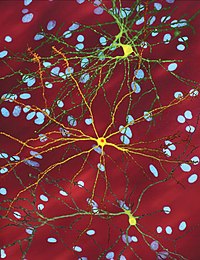
Photo from wikipedia
As the world's population ages, neurodegenerative disorders are poised to become the commonest cause of death. Despite this, they remain essentially untreatable. Characterized pathologically both by the aggregation of disease-specific… Click to show full abstract
As the world's population ages, neurodegenerative disorders are poised to become the commonest cause of death. Despite this, they remain essentially untreatable. Characterized pathologically both by the aggregation of disease-specific misfolded proteins and by changes in cellular stress responses, to date, therapeutic approaches have focused almost exclusively on reducing misfolded protein load-notably amyloid beta (Aβ) in Alzheimer's disease. The repeated failure of clinical trials has led to despondency over the possibility that these disorders will ever be treated. We argue that this is in fact a time for optimism: Targeting various generic stress responses is emerging as an increasingly promising means of modifying disease progression across these disorders. New treatments are approaching clinical trials, while novel means of targeting aggregates could eventually act preventively in early disease.
Journal Title: Annual review of cell and developmental biology
Year Published: 2020
Link to full text (if available)
Share on Social Media: Sign Up to like & get
recommendations!